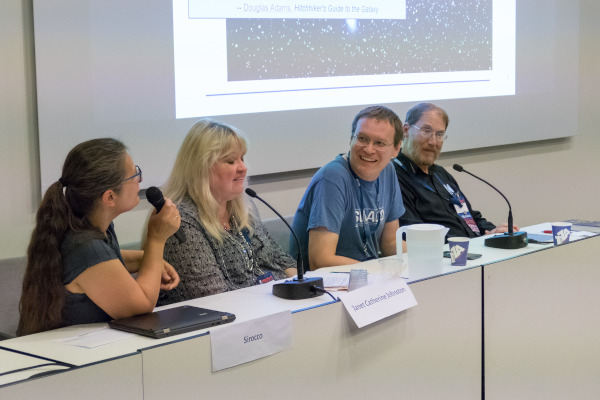Strangest of All

Not having had much time to read fiction recently, I’ve found short stories easier to digest rather than putting the effort into picking up a longer novel. So as well as picking through some of the Hugo nominations, I’ve also read Strangest of All, an anthology of science fiction stories focused on astrobiology.
It’s actually a free book, available from Julie Nováková who edited it with help from the European Astrobiology Institute, and each is accompanied by an essay about the science of each story. All but one of the stories in the book could be considered hard SF, and take a look at our first encounters with alien life. Sometimes that life is simple bacteria, sometimes it’s an intelligent civilisation.
My favourite story in the book was probably the first one – War, Egg, Ice, Universe by G. David Nordley, which is narrated from the perspective of the aliens. It reminded me of some of Stephen Baxter’s early works, where you spend much of the story trying to figure out the environment that the story is set in, based on clues in descriptions and terminology.
There was also Into the Blue Abyss, by Geoffrey A. Landis, which dealt with an expedition into the depths of Uranus. I mention this not only because it was a good story, but also because one of my few claims to fame is being on a panel at Worldcon 75 with the author.
A Jar of Goodwill, by Tobias S Buckell, examines the difficulties not in finding life, but in deciding whether it’s actually intelligent. Termites build homes, whales communicate with each other, but would either prevent exploitation of a new world?
The last story, Martian Fever by Julie Nováková, deals with the question of what to do if life is found on Mars by a colony expedition, and that life turns out not to be good for our own immune systems. Quarantine and lock down means something a lot more drastic when you’re stuck on another world. By another coincidence, the contamination of (or by) Mars was another panel I did at the same Worldcon.
All the stories were good though, and the essays which followed them dived into the background and science of the topics discussed.
And since I mentioned Worldcon, this year’s 78th World Science Fiction Convention is going virtual, which is great for those of us who decided New Zealand was too far to go for a convention.
So I’ve also read the Hugo nominee short stories, which is about all I’ve had time to go through this year. Unlike the above stories, they are mostly Fantasy rather than Science Fiction, which is fine, except I’m in much more of a mood for SF at the moment so I wasn’t greatly excited by most of them.
My favourite was As The Last I Shall Know by S L Huang, which took an idea and examined the ramifications of that idea. So even though it was more Cultural than Science, I found it more meaty than the others, and more interesting. A Catalog of Storms by Fran Wilde was probably my next favourite.
A few of the nominations in the other categories I’ve read or seen, but most of them I haven’t so I’ll be leaving a lot of votes blank.
